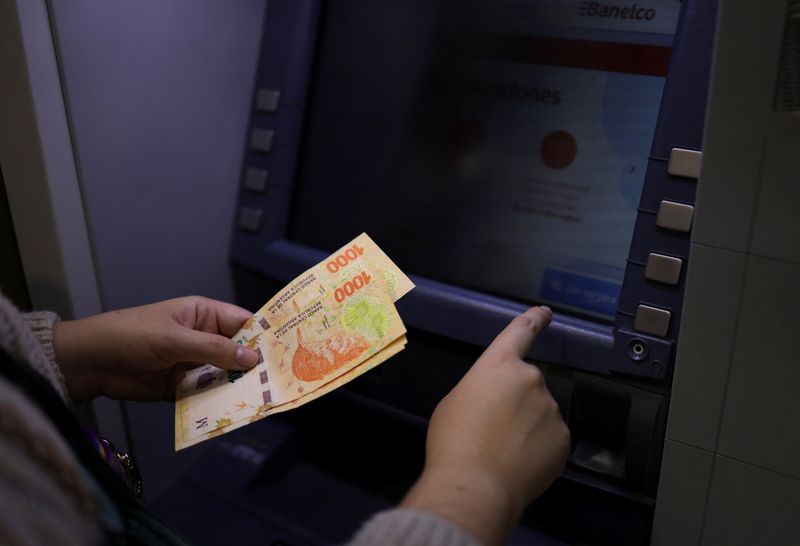By Eliana Raszewski
BUENOS AIRES (Reuters) - Argentine peso bills, devalued by years of inflation now soaring near 60%, are starting to cause a literal strain on wallets - with the largest banknote in circulation worth under $5 in commonly used exchange markets.
That means people need to carry around huge wads of cash, a security concern and logistical headache for savers, businesses and banks.
The situation marks Argentina out in the region, except perhaps for outlier Venezuela. The largest note in Mexico and Peru is worth around $50, in Brazil it is $40, in Chile and Colombia some $25 and in Paraguay $15.
In Argentina the 1,000 peso note is technically worth $8.40 using the official exchange rate, but with strict capital controls limiting dollar purchases most people use alternative markets where the same amount gets you $4.80.
Ten years ago, 1,000 pesos was worth $200. Until around two decades ago the same amount would have got you a full $1,000.
"I have to carry that huge wad of bills in my wallet, because it doesn't fit in my pockets, and I fear getting robbed," said Laura, 40, a lawyer from capital Buenos Aires.
"The 1,000-peso bill is no longer enough for anything. The (monthly) rent for my house is just over 50,000 pesos."
Years of high inflation, tight capital controls since 2019 to prevent currency flight, and popular black markets for trading dollars have hit confidence in the peso.
The low value of the biggest tender means many businesses in the cash-heavy economy are left with huge physical piles of money at the end of the day. It is not unusual for people to arrive to pay larger outlays with bricks of banknotes.
"The denomination of the bills is very decoupled from the average transactions of the economy," said Camilo Tiscornia, director of C&T Asesores Economicos, adding that this creates inefficiencies in the market. "You have to make ridiculous payments with a huge number of bills."
A 1,000 peso note will hardly buy you two packages of top-end toilet roll, while a children's menu hamburger with fries in a fast-food chain comes in at 940 pesos.
While electronic payments have increased during the COVID-19 pandemic, a large part of sales are still made in cash.
President Alberto Fernandez, who is trying to lead a "war against inflation," unveiled newly designed banknotes on Monday, but there were no changes to the largest denomination. He contends that the solution is finding a way to curb inflation, not issuing bigger denomination bills.
A financial sector source said the situation was also straining bank vaults, where physical cash simply takes up more room and creates higher costs.
"For banks it is crazy time with operating and storage costs," the source said, asking not to be identified. "Here we have entities that are saturated with banknotes."
Argentina: Paying the bill - https://graphics.reuters.com/ARGENTINA-CURRENCY/lbvgndljkpq/chart.png 1babb7e9-15f8-422d-aaee-f7496196df251
